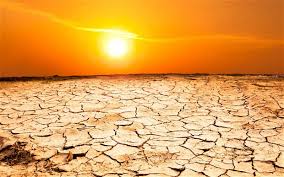Topic - Drought relief on order
That scarcity of water and its poor quality plague[विपत्ति] many parts of India this year is widely acknowledged [स्वीकार करना]today. Yet it has taken the Supreme Court to call out the reluctance [अनिच्छा] of some States to declare a drought while simultaneously decrying[निंदा करना] the Centre’s recourse[सहारा] to “federalism” as an excuse to avoid taking up the matter with these States. In the judgment, delivered on a writ petition filed by the non-governmental organisation Swaraj Abhiyan, the Supreme Court concluded that Bihar and Haryana had been remiss in not officially declaring a drought despite clear indications of water scarcity;
also that Gujarat was late in its declaration made in April 2016. The governments of Bihar and Haryana had argued that a declaration of drought was not necessary as rainfall deficits had eased in many districts by July 2015. But the Supreme Court has pointed out that many districts in these States have since progressively suffered rainfall deficits till as late as October 2015. The court also said that steps taken by State governments for irrigation and foodgrain production, or the presence of perennial [चिरस्थायी] rivers(which the Bihar government has submitted as a factor), alone cannot determine whether there is a drought-like situation or not. It has directed the Centre to take proactive steps in drought mitigation as well as in assessment, planning and relief as mandated by the Disaster Management Act, 2005.
Drought is attributed to rainfall deficit in several States, suggesting that meteorological and natural factors are primarily responsible for the phenomenon. This, however, is an incomplete explanation. Water scarcity — in both surface and ground water — is also the result of failure to regulate water extraction, storage, wastage and patterns of use. The excessive use of deep borewells to extract groundwater has eroded [नष्ट करना] the capacity of aquifers[जलवाही स्तर] to replenish[फिर से भरना]. Poor reservoir management has led to silt[पानी के बहाव से लायी हुई मिट्टी या रेत] accumulation[संचय], among other issues limiting water storage. Lack of water harvesting and over-irrigation owing to cropping choices and patterns have depleted water tables. Preparation for drought and ipso facto for a deficit in annual rainfall must go beyond mitigation and include steps to address this man-made scarcity. This cannot be done without a coordinated effort at all levels of government. The Supreme Court has directed the Centre to constitute a National Disaster Response Force, establish a National Disaster Mitigation Fund, formulate a National Plan on mitigation and crisis management, and standardise the methodology for declaring a drought. If one sets aside the question of whether this is another case of judicial overreach, it is difficult to deny that this is a truly landmark judgment. By laying down a broad framework for dealing with such situations and firmly emphasising that the government cannot absolve itself from acting decisively[निश्चित रूप से], the manner in which we deal with drought in the future may change markedly, and for the better.
Vocabulary :
plague[विपत्ति]- a large number of harmful or annoying things
- The country was hit by a plague of natural disasters that year.
- a plague of locusts
- There has been a plague of bank robberies in the area.
acknowledge [स्वीकार करना] -to say that you accept or do not deny the truth or existence of (something) : admit
- They acknowledged that the decision was a mistake.
- Do you acknowledge that you caused this mess?
- I acknowledge (the fact) that I hurt you, and for that I am sorry.
reluctance [अनिच्छा]-feeling or showing doubt about doing something : not willing or eager to do something
- We were reluctant to get involved.
- He might agree but seems reluctant to admit it.
decrying[निंदा करना]-to say publicly and forcefully that you regard (something) as bad, wrong, etc.
- In her article, she decries the pollution of the environment by manufacturers.
- Parents decried [=condemned] the movie's emphasis on sex.
recourse[सहारा]-an opportunity or choice to use or do something in order to deal with a problem or situation
- His only recourse [=the only thing he can do] is to file a complaint with the management.
- She has no legal recourse against the magazine. [=there is no legal action she can take against the magazine]
perennial [चिरस्थायी]-living for several years or for many years : having a life cycle that is more than two years long
- a perennial plant
- This variety of oregano is perennial.
erode [नष्ट करना]-to gradually destroy (something) or to be gradually destroyed by natural forces (such as water, wind, or ice)
- Crashing waves have eroded the cliffs along the beach.
aquifer[जलवाही स्तर]-a layer of rock or sand that can absorb and hold water
- an underground aquifer
replenish[फिर से भरना]-to fill or build up (something) again
- An efficient staff of workers replenished the trays of appetizers almost as quickly as guests emptied them.
- He replenished his supply of wood in preparation for the winter.
silt[पानी के बहाव से लायी हुई मिट्टी या रेत] -sand, soil, mud, etc., that is carried by flowing water and that sinks to the bottom of a river, pond, etc.
accumulation[संचय]- to gather or acquire (something) gradually as time passes
- She has slowly accumulated [=amassed] a fortune.
- You can accumulate [=earn] bonus points by participating in surveys.
For daily current affairs CLICK HERE

